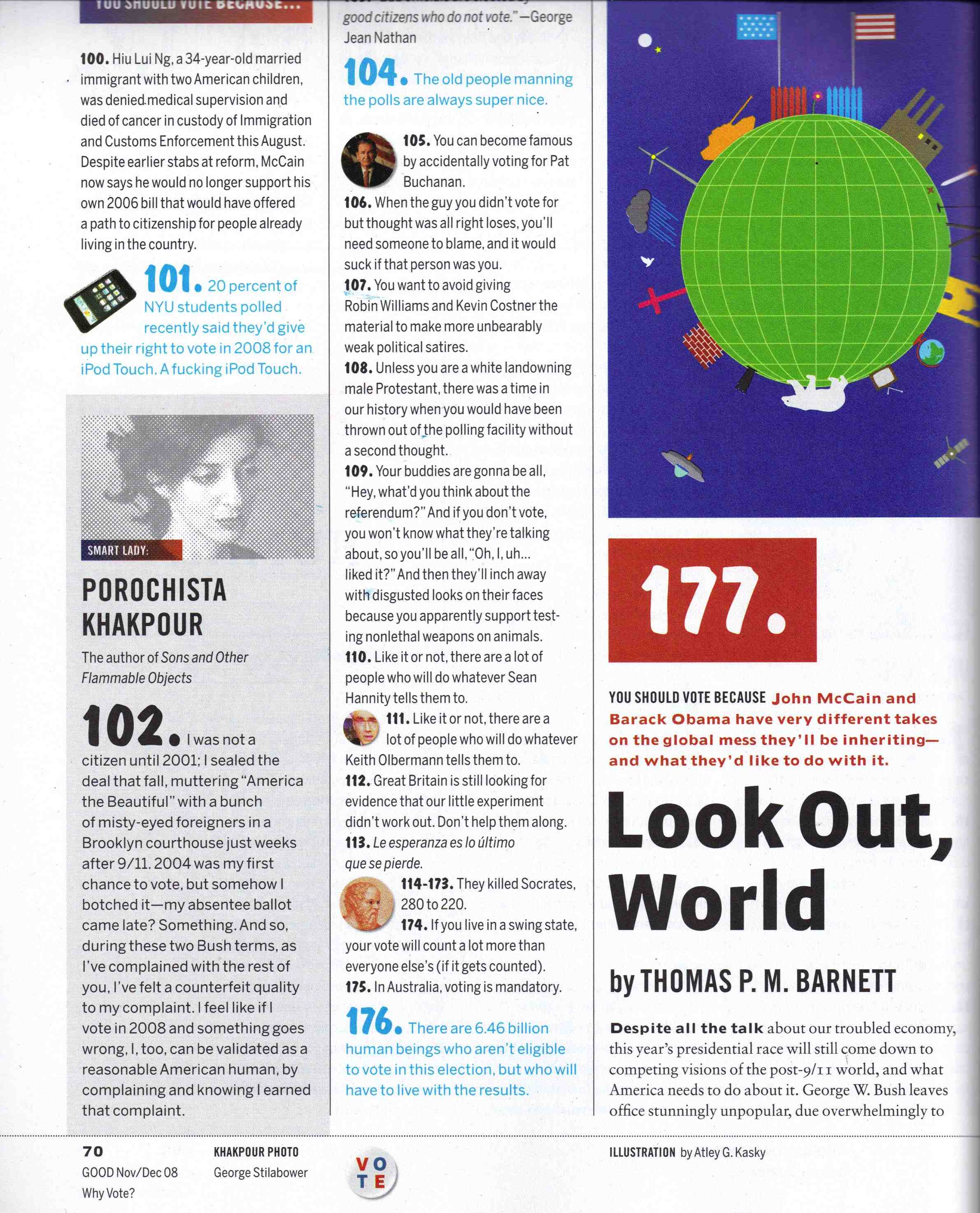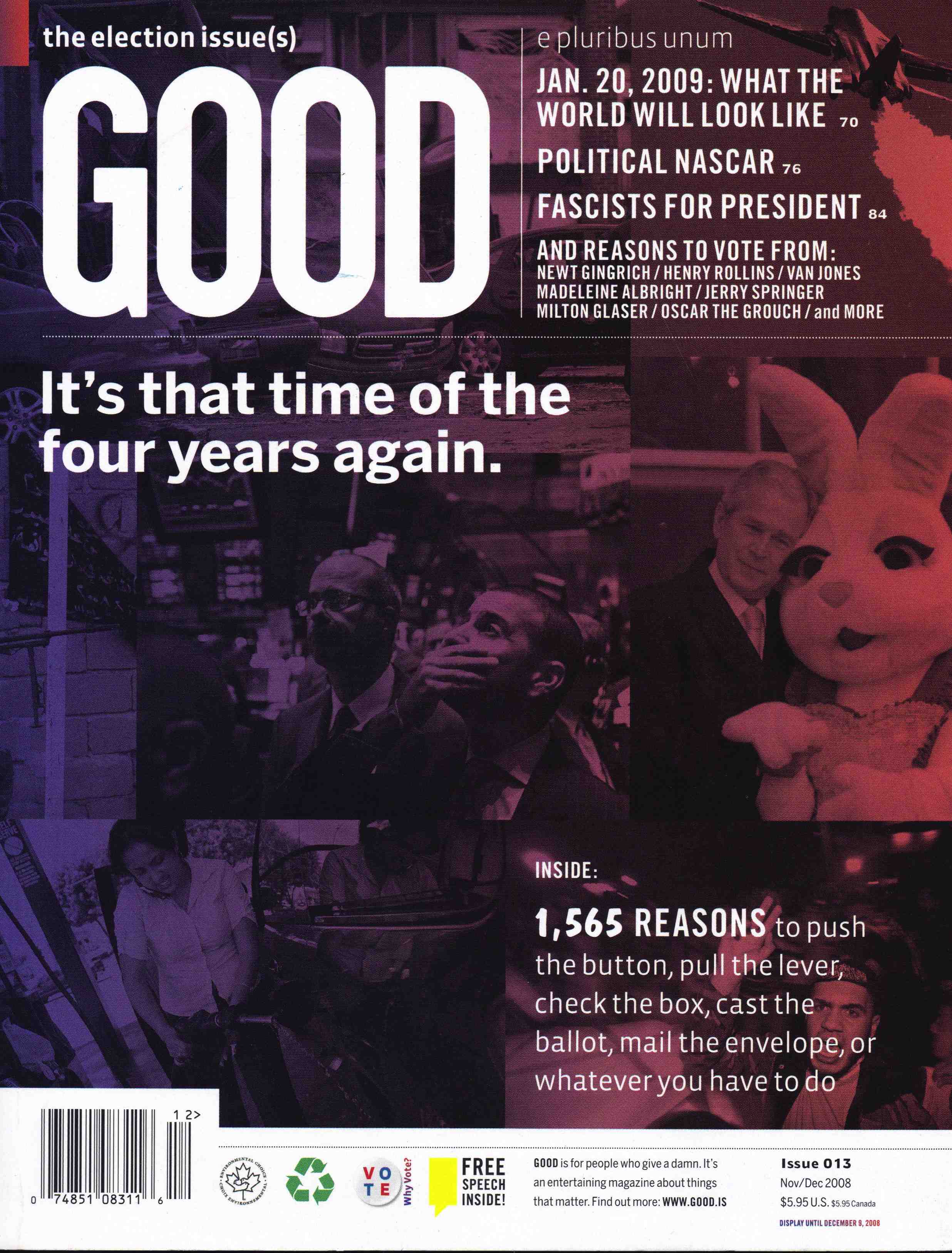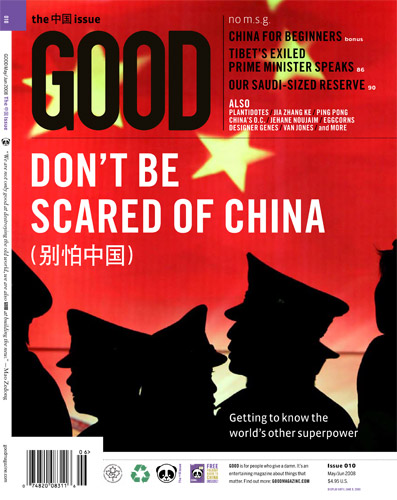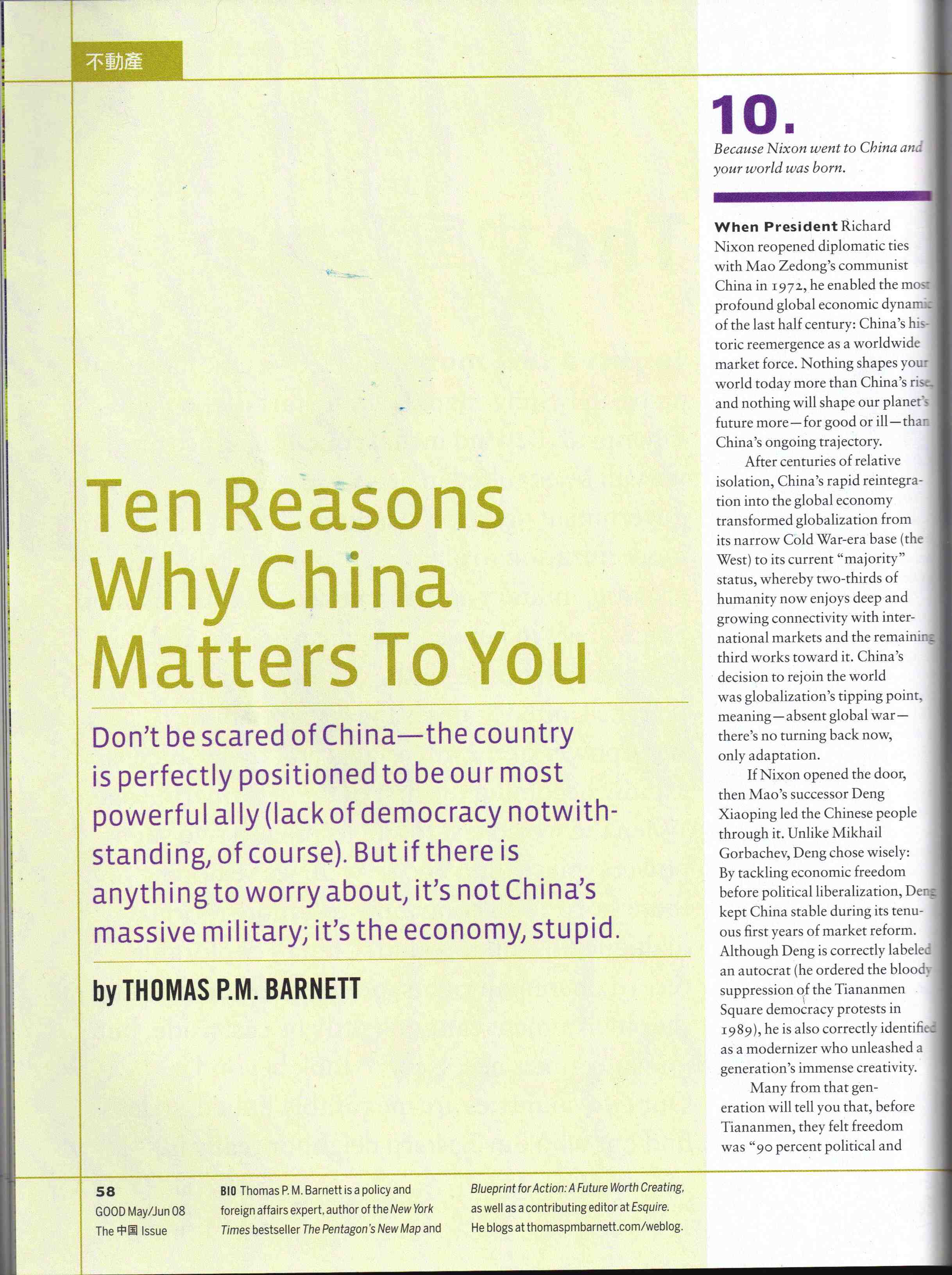Blast from my past: "Look Out, World" (2008)
 Thursday, November 25, 2010 at 12:01AM
Thursday, November 25, 2010 at 12:01AM
by
Thomas P.M. Barnett
Good magazine, Nov-Dec 2008.
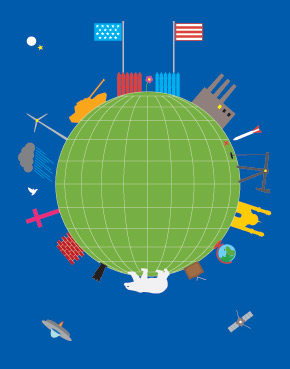
Why Vote? Reason 177
You should vote because John McCain and Barack Obama have very different takes on the global mess they'll be inheriting—and what they'd like to do with it.
Despite all the talkabout our troubled economy, this year’s presidential race will still come down to competing visions of the post-9/11 world, and what America needs to do about it. George W. Bush leaves office stunningly unpopular, due overwhelmingly to his schizophrenic foreign policy (six years Hyde, two Jekyll). Given the strong political impetus for change, this election has always been the Democrats’ to lose.
True to form, the Dems have done their best to make it a close vote by nominating an African-American senator with limited national security credentials. But Barack Obama gave them no choice. By redefining the way campaigns are mounted in this networked age, his candidacy has produced the sort of worldwide electricity that most certainly will get him selected as Time’s “person of the year”—if he wins.
In contrast, John McCain’s candidacy has the consistency of comfort food, the underlying personal message seemingly, “I’ve waited long enough.” He is the default candidate—as in, “If you aren’t willing to risk it all on Obama, think about me.” Unlike Obama or Hillary Clinton, voting for McCain as president offers no history-making opportunity, which makes the choice of Sarah Palin as his running mate all the more politically clever. But even with that move—bold or desperate or both—McCain remains an essentially back-to-the-future choice: a pre-boomer for a public fed up with that generation’s do-nothing politics.
Both nominees offer a strongly “realist” perspective on international affairs, with the differences stemming primarily from their generational backgrounds. McCain’s stark realism stems from the Cold War. Ronald Reagan’s personal mystique was largely a fiction of our imagination, but McCain’s legend—the good and the bad—is based on true stories of personal heroism. He lived them all. If you want someone who can recognize human evil and fight it tooth and nail, McCain’s your man.
Obama’s subtle realism emerged from a far different time: the truly tumultuous 1970s, where we first locate much of today’s globalization—energy and food shocks, Middle East conflicts, environmental awareness, global market swings, and transnational terrorism. Befitting those fractured times, Obama’s journey plays out like an ABC “Movie of the Week”: the biracial child who willed himself from a Jakarta grade school to the pinnacle of Harvard Law, landing next on the South Side of Chicago as a community activist who instinctively countered the prevailing counterculture. If you want someone who can recognize global complexity and manage it with confidence and care, Obama’s your man.
Both McCain and Obama represent quintessentially American stories, with their amazing personal trajectories obscuring the underlying political philosophies each brings to a possible administration. Pundits (and Karl Rove) would have you believe that fear alone will settle this election. But the question every voter must answer is not, “Do you fear?” but rather, “What do you fear more?”
Barack Obama will make America smarter about the outside world, and John McCain will make the world smarter about America. And on that score, there are plenty of ways to divvy up the global landscape. Here are ten criteria you can use to compare the candidates and help you break down the basic choices.
Priorities: Where’s the focus? Early last summer, Fortune asked the candidates to lay out the “gravest long-term threat to the U.S. economy.” According to the article, Obama didn’t blink: Our energy policy. McCain paused for several long seconds before answering, “Well, I would think that the absolute gravest threat is the struggle that we’re in against Islamic extremism, which can affect, if they prevail, our very existence.”
Those answers speak volumes about how each senator approaches international affairs. Obama focuses on upstream, big-picture causality (e.g. fix energy and improve everything that follows from it), while McCain gravitates toward more downstream, immediate tangibles (stop the bad guys from doing bad things). So if you want a terrorism-centric foreign policy, McCain is your guy. If you want something broader, Obama makes more sense. With McCain, you’re less likely to experience a security breakdown, but more likely to see a wider array of ongoing problems exacerbated. With Obama, you’re more likely to see more general improvement on a host of issues, but you stand a greater chance of waking up one morning to some nasty surprise. The basic question is, which spooks you more concerning America’s resilience? The perceived steady decline, or the occasional external shock?
ADVANTAGE: The American voter, because there’s a distinct choice.
| Who should America seek out as strategic allies? If you think it's the French and the Germans, you need to update your global database. |
Allies: How to pick ’n’ save? Here McCain makes a bold call, but an awful one. His proposed League of Democracies—an international alliance of democratic countries—is as close as anyone has come to mindlessly regurgitating Cold War memes. McCain additionally calls for ousting Russia from the G-8 (to be replaced by India), while leaving rising China out in the cold. Here’s why it won’t work: When you tell off both Russia and China, you kill India’s incentives to bind itself to the West. Why would New Delhi pick that fight with two huge neighbors also on the rise? If the Indians wouldn’t make that call during the Cold War, what’s the additional incentive now? Ditto for Brazil, South Africa, and a host of other rising pillars of the southern hemisphere. They’ll simply view McCain’s proposed forum as yet another arena in which the old West gets to boss them around and demand they toe its preferred line.
Here’s a big clue as to whom America should seek out as strategic allies: rising defense budgets, big standing armies, and a willingness to use them in other peoples’ (failed) states. If you think that’s the French and the Germans, you need to update your global database, because in this century, the countries with the most rapidly expanding global economic networks are the ones most incentivized to play—in the manner of the United States—globalization’s bodyguards.
The far more careful and circumspect Obama wins this round hands down. He’ll clearly bring a non-Eurocentric view to global alliances, speaking as he constantly does about the need to integrate a rising Russia, China, and India into our plans. McCain makes similar noises, but all of that is drowned out by his League of Democracies. As his response to the Russia-Georgia conflict amply demonstrated, given the right prompt, he’ll reflexively knee-jerk us into another Cold War standoff at a point when America needs to be stocking up on allies—as immature as they may be—rather than adding more enemies.
ADVANTAGE: Obama, for the sole reason that he’s smart enough not to let Georgia—on its own—declare war between NATO and Russia.
The vision thing: What to expect? You can tell a lot about each candidate’s modus operandi on foreign affairs by the campaigns they’ve built. Obama’s team of 300-or-so advisors is methodically organized, reflecting a corporate ethos that minimizes ego clashes and maximizes on-message delivery. From the experienced Clinton gang, Obama’s managed to attract the very cream of the crop, so expect a well-run State and Defense. Obama’s decision to pick Joe Biden as his running mate only strengthens that.
You should anticipate a far more conservative first term from Obama on national security than Bush’s previous eight years. Obama will seek to carefully unwind America’s tie-down in Iraq and Afghanistan so as to expand his administration’s freedom of action elsewhere, but this will take a long time. Some bad things will definitely happen in the meantime. The potential upside is substantial on restoring America’s good standing around the world.
McCain, on national security, is truly “what you see is what you get.” Despite the hovering from the neocons, McCain will be his own man and run his own foreign policy. Palin as vice president adds nothing to the senator’s well-credentialed resume. Letting McCain be McCain will be a bumpy ride for all involved: the rest of the U.S. government, the American people, our allies, and—most importantly—our enemies; but always entertaining, and full of sharp turns. If he had won it all in 2000, he would have arrived early enough in the rise of Russia, India, China, and Brazil to perhaps have had a serious opportunity to get them in line, especially on the heels of 9/11. But now, trying to ride herd these rising great powers could easily backfire if pursued angrily (remembering the man’s temper), so the downside on McCain could be profound.
ADVANTAGE: Obama, because a more conservative—dare I say, humble—American foreign policy is what the world needs now.
Heal the force: How to repair the U.S. military after Iraq?Here’s where McCain’s unimpeachable credentials in national security and his history as a rice-bowl-breaking maverick could well serve America’s strategic needs. There will be a huge bureaucratic and political impetus to “heal the force” after Iraq, meaning rest the troops (good idea) and resume buying all the same outdated military platforms and weapons systems (a truly bad idea that will leave us as unprepared for the next Iraq as we were for the last one).
McCain is far more likely—believe it or not—to push the necessary changes through a Democratic-controlled Congress, which, in an inevitable “anything but Bush” post-election fit of pique, could easily trash all the good work so far accomplished by Secretary of Defense Robert Gates, General David Petraeus, and many others. Obama, especially since he’ll bring back all the same security players from the Clinton years (who were too deferential to the military), is more likely to pass on that fight in favor of other early possible legislative victories.
The fly in the ointment? McCain’s bevy of neocon advisors, armed with that League of Democracies notion, might just as easily try to have their cake (Cold War Leviathan force) and eat it too (continue to engage in plenty of post-9/11-style small wars). That would, indeed, look like a third Bush administration.
ADVANTAGE: Definitely the maverick McCain, but only so long as Father Time doesn’t toss the presidency—in the form of Sarah Palin—back to the neocons.
Globalization: America’s new bogeyman, or its logical cause célèbre? Despite the trade-protectionist leanings Obama put on display for the primaries, where his proposal to renegotiate NAFTA was particularly egregious, he has assembled a nice collection of Clintonian economic advisers. Plus, Obama’s more holistic approach to national security is less likely to get America trapped in useless overseas adventures and more likely to make him sensitive to the needs of emerging and developing economies. Obama will never match Clinton’s zeal, but he’s unlikely to screw up globalization’s continued advance.
McCain’s senate record indicates a fierce free-trade stance. And since a Democratic-controlled Congress could easily engage in all manner of trade protectionism, especially vis-à-vis China and recently re-demonized Russia, having a Republican in the White House makes a lot of sense if you don’t like that sort of thing. The problem would be—again—McCain’s penchant to pick unnecessary fights with globalization’s rising economic pillars, too few of which will qualify for his democracies-only club.
Then there’s the larger reality that globalization faces a populist headwind that is likely to pick up dramatically in coming years. A stubborn McCain, as correct as his economic instincts may be, could easily find his politics out of synch with global trends, resulting in stalemated trade negotiations overseas and deadlocked legislation back home.
ADVANTAGE: Obama, because he’ll guarantee half-a-loaf outcomes on most issues and could spark the necessary shift to progressivism that globalization desperately needs.
| Letting McCain be McCain will be a bumpy ride for all involved: the rest of the U.S. government, the American people, our allies, and—most importantly—our enemies. |
Climate change: The end of the world as we know it? Climate change is becoming a dominant global narrative, one that indirectly challenges globalization’s advance by casting doubt on whether developing nations can emerge as the West once did. The brutal truth is they can’t, but not simply due to climate change. There are a host of more immediate reasons (air pollution, supply constraints) that speak to humanity’s need to move beyond oil and any number of self-limiting industrial-age technologies. Because America remains the world’s single biggest national market (meaning we control a lot of demand), we must either lead or eventually get out of China and India’s way.
Both Obama and McCain seem to understand the larger competitive challenge framed by global warming, which isn’t surprising because both are problem-solvers at heart. Given today’s political landscape, both are selling the chimera of national energy independence (a dubious economic goal), linking it to job creation in the high-tech “green” sector. Usually, it’s safer to go with the Republican candidate when it comes to promoting entrepreneurs and innovation, so a slight edge to McCain on that score. But since any response to climate change will entail some serious cooperation with emerging economies on their infrastructure development, and with vulnerable developing economies on the aid-related subjects of food security and disease control, Obama’s “dignity” agenda tops McCain’s focus on demanding democracy.
ADVANTAGE: Push. Let’s stipulate that both candidates will move the ball forward significantly.
Iraq: When do we wrap up? The Iraq “war,” or whatever you want to call it, is clearly a moving target, meaning where Iraq was at the beginning of these campaigns—when positions were initially articulated—and where it is today, are two vastly different things. The criticism now focuses primarily on the high cost involved.
McCain gets credit for advocating the surge and the associated counterinsurgency strategy, two much-needed changes on which the Bush administration wasted many months—and lives—before adopting. Basic lesson? When McCain makes a decision, he follows it through to the end, eagerly seeking out new solutions to persistent problems.
But for those who objected to the war, Obama also gets credit for opposing the invasion from the start. As for opposing the surge, Obama now appears less flexible than McCain in admitting his party’s past mistakes and moving on to better solutions.
In political terms, the problem McCain faces is that improvements in Iraq favor all the positions Obama has long advocated. So again, we see the essential difference emerge. McCain’s approach has the value of concentrated effort, but suffers the dynamic of “one damn thing after another,” meaning: Just after you fix one thing, you’re on to the next. Obama is less likely to suffer big losses in any single situation, but he’s also less likely to score any big wins.
As for wrapping up America’s combat involvement in Iraq, the differences between the two candidates have narrowed dramatically: Obama calls for a withdrawal of combat troops by 2010, while McCain targets 2012. The major difference concerns the pace of withdrawal: Obama says the Iraqi government should decide; McCain says our generals should decide. In reality, it’ll be our generals right up to the point when the Iraqis decide for themselves. This “war” stopped being America’s to “win” or “end” a long time ago—to wit, Iraq’s government wants us gone by 2011.
ADVANTAGE: Obviously McCain, because of his courageous call on the surge.
Afghanistan and Pakistan: How do we ramp up? Obama has made some hawkish statements about taking the fight against al Qaeda and the Taliban directly into Pakistan. Much like McCain’s tough talk regarding Iran’s involvement in Iraq, such statements should be taken with a grain of salt. Pakistan, like Iran, is a far bigger and more potent entity than its troubled neighbor, and possesses considerable leverage on its own. With Pervez Musharraf gone from power, expect even more autonomy from an Islamabad intent on showing it’s no U.S. puppet.
When George W. Bush redirected the war on terror in 2003 from Afghanistan to Iraq, that was a radical move. Today’s radical move would involve rapidly re-directing U.S. military efforts back toward Afghanistan, thus accelerating Iraq’s movement toward policing its territory and handling its neighbors largely on its own. In asserting that Iraq will remain the central issue for the next president, McCain actually stakes out the more conservative position here, whereas Obama now advocates a more aggressive line.
Odds are good that Afghanistan will once again become the central front in the war on terror early in the next president’s term, and that some modest troop surge will accompany a revamped counterinsurgency strategy that takes on many of the same characteristics of what worked in Iraq.
Attempts by the competing campaigns to portray either Iraq or Afghanistan as the “good war” are largely rhetorical at this point. Events on the ground appear to be driving this re-direct in operational focus, and both candidates advocate the same basic ramp-up in U.S. capabilities and resources.
ADVANTAGE: McCain, because you have to go with experience on this potential quagmire.
| Obama will seek to carefully unwind America's tie-down in Iraq and Afghanistan so as to expand his administration's freedom of action elsewhere, but this will take a long time. |
Iran: How far do we go? Here McCain advocates a hard line strikingly evocative of George Bush’s rationale for invading Iraq: prevent a regime that sponsors transnational terrorism from achieving weapons of mass destruction. Obama, in contrast, advocates a more direct diplomatic approach aimed at revamping U.S.-Iranian relations as a whole. How you judge the validity of their approaches depends on your perception of the threat.
If you trust the long and varied history of strategic nuclear deterrence, then you’re probably of the opinion that the Shia bomb (Iran) won’t be any more usable than the Jewish (Israel), Sunni (Pakistan), Hindu (Indian), Confucian (Chinese), or Christian (the rest) bombs, especially since Israel very likely possesses at least 200 deliverable nuclear warheads. And if you’re familiar with the history of nuclear proliferation, you’ll know that declared nuclear powers tend to be extremely careful with the technology, whereas undeclared powers (e.g., Pakistan, North Korea, Israel, South Africa) have been known to share. So the real question is, Do you think Tehran is crazy enough to give either Hezbollah or Hamas a nuke? And if there’s even a scintilla of chance there, should America pre-emptively strike, or instead aggressively seek some détente with Iran? In other words, is it time for Dr. Strangelove to step up, or should “Nixon” finally go to Tehran?
Iran, of course, complicates the matter by in effect saying, “You know we’ve already got the ‘guns’ [i.e. missiles] and are cranking out ‘gunpowder’ [i.e. uranium], but since we’re not manufacturing any ‘bullets’ [i.e. warheads], you can’t actually prove anything—or ever be quite sure how close we’ve come to putting it all together.” Couple that stance with Ahmadinejad’s frequent verbal threats concerning Israel’s right to exist and there are plenty of grounds for both McCain’s calculated threats and Obama’s calculated engagement.
But if a conventional bombing campaign could assuredly take out Iran’s nuclear facilities, chances are the Bush administration would have pulled that trigger by now; and if not the Bush administration, then certainly Israel. If neither could see its way to launching a strike by the end of the Bush administration’s second term, then it’s highly unlikely that such a campaign—absent full-out invasion and occupation—will ever make sense. In short, we’d have to go nuclear to stop Tehran from getting nuclear.
If that strategic logic and historical record ring true to you, then you definitely want Obama in the White House, because McCain could well launch us into a war with Iran. If you consider that pathway inevitable, then McCain’s the better choice, along with a strategic missile defense that—despite all the failures up to now—finally works as promised.
ADVANTAGE: Push. Totally depends on your worldview, unless you’re committed to granting Israel a zero deductible on America’s nuclear umbrella insurance policy.
The war on terror: Remember that? It must seem odd that, seven years into this war on terror, al Qaeda itself seems like such a strategic afterthought. Part of this is due to the Bush administration’s real success in disrupting al Qaeda’s global networks.
But it’s also due to al Qaeda choosing to become less operationally focused and evolving into more of a worldwide anti-American/Western branding mechanism—sort of a Jihadis-R-Us. Sad to say, this is probably as close to “victory” as we’ll come for the foreseeable future because, cynically speaking, transnational terrorists are a useful bogeyman for a networked age.
As somebody who’s worked in national security affairs for close to two decades, I’ll tell you that as far as anti-terrorism and counter-terrorism are concerned, it won’t matter much who gets elected president. The U.S. government possessed such a security community prior to 9/11, and that community got a whole lot bigger after 9/11. Today, that community operates like any sizeable and widely distributed bureaucracy: just well enough not to fail spectacularly, but nowhere near well enough to succeed spectacularly.
So in regards to the candidates, frankly, it’s a coin toss. Obama would present a more conciliatory face, which can invite more aggression or subdue it. McCain would present a less compromising face, which can accomplish the same. Both will promise and likely achieve somewhat more secure borders, and any new management might inject the Department of Homeland Security with more purpose and better execution, but expect the world to continue appearing more dangerous over time (God bless our sensational media) while actually becoming more secure. And if it makes you feel any better, just go on believing that Washington really runs America and that America really runs the world.
ADVANTAGE: Draw. This leaves the final count tied at 3 apiece, with 4 toss-ups. Expect another tantalizingly close vote.
